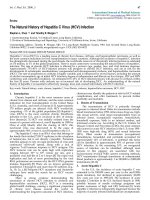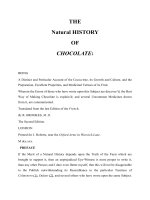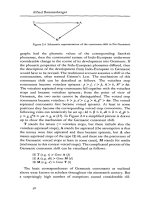THE NATURAL HISTORY OF MORALS
Bạn đang xem bản rút gọn của tài liệu. Xem và tải ngay bản đầy đủ của tài liệu tại đây (164.84 KB, 33 trang )
Beyond Good and Evil
CHAPTER V: THE NATURAL
HISTORY OF MORALS
186. The moral sentiment in Europe at present is
perhaps as subtle, belated, diverse, sensitive, and refined, as
the ‘Science of Morals’ belonging thereto is recent, initial,
awkward, and coarse-fingered:—an interesting contrast,
which sometimes becomes incarnate and obvious in the
very person of a moralist. Indeed, the expression, ‘Science
of Morals’ is, in respect to what is designated thereby, far
too presumptuous and counter to GOOD taste,—which is
always a foretaste of more modest expressions. One ought
to avow with the utmost fairness WHAT is still necessary
here for a long time, WHAT is alone proper for the
present: namely, the collection of material, the
comprehensive survey and classification of an immense
domain of delicate sentiments of worth, and distinctions of
worth, which live, grow, propagate, and perish—and
perhaps attempts to give a clear idea of the recurring and
more common forms of these living crystallizations—as
preparation for a THEORY OF TYPES of morality. To
be sure, people have not hitherto been so modest. All the
philosophers, with a pedantic and ridiculous seriousness,
112
of
301
Beyond Good and Evil
demanded of themselves something very much higher,
more pretentious, and ceremonious, when they concerned
themselves with morality as a science: they wanted to
GIVE A BASIC to morality— and every philosopher
hitherto has believed that he has given it a basis; morality
itself, however, has been regarded as something ‘given.’
How far from their awkward pride was the seemingly
insignificant problem—left in dust and decay—of a
description of forms of morality, notwithstanding that the
finest hands and senses could hardly be fine enough for it!
It was precisely owing to moral philosophers’ knowing the
moral facts imperfectly, in an arbitrary epitome, or an
accidental abridgement—perhaps as the morality of their
environment, their position, their church, their Zeitgeist,
their climate and zone—it was precisely because they were
badly instructed with regard to nations, eras, and past ages,
and were by no means eager to know about these matters,
that they did not even come in sight of the real problems
of morals—problems which only disclose themselves by a
comparison of MANY kinds of morality. In every
‘Science of Morals’ hitherto, strange as it may sound, the
problem of morality itself has been OMITTED: there has
been no suspicion that there was anything problematic
there! That which philosophers called ‘giving a basis to
113
of
301
Beyond Good and Evil
morality,’ and endeavoured to realize, has, when seen in a
right light, proved merely a learned form of good FAITH
in prevailing morality, a new means of its EXPRESSION,
consequently just a matter-of-fact within the sphere of a
definite morality, yea, in its ultimate motive, a sort of
denial that it is LAWFUL for this morality to be called in
question—and in any case the reverse of the testing,
analyzing, doubting, and vivisecting of this very faith.
Hear, for instance, with what innocence—almost worthy
of honour—Schopenhauer represents his own task, and
draw your conclusions concerning the scientificness of a
‘Science’ whose latest master still talks in the strain of
children and old wives: ‘The principle,’ he says (page 136
of the Grundprobleme der Ethik), [Footnote: Pages 54-55
of Schopenhauer’s Basis of Morality, translated by Arthur
B. Bullock, M.A. (1903).] ‘the axiom about the purport of
which all moralists are PRACTICALLY agreed: neminem
laede, immo omnes quantum potes juva—is REALLY the
proposition which all moral teachers strive to establish, …
the REAL basis of ethics which has been sought, like the
philosopher’s stone, for centuries.’—The difficulty of
establishing the proposition referred to may indeed be
great—it is well known that Schopenhauer also was
unsuccessful in his efforts; and whoever has thoroughly
114
of
301
Beyond Good and Evil
realized how absurdly false and sentimental this
proposition is, in a world whose essence is Will to Power,
may be reminded that Schopenhauer, although a pessimist,
ACTUALLY—played the flute … daily after dinner: one
may read about the matter in his biography. A question by
the way: a pessimist, a repudiator of God and of the world,
who MAKES A HALT at morality—who assents to
morality, and plays the flute to laede-neminem morals,
what? Is that really—a pessimist?
187. Apart from the value of such assertions as ‘there is
a categorical imperative in us,’ one can always ask: What
does such an assertion indicate about him who makes it?
There are systems of morals which are meant to justify
their author in the eyes of other people; other systems of
morals are meant to tranquilize him, and make him self-
satisfied; with other systems he wants to crucify and
humble himself, with others he wishes to take revenge,
with others to conceal himself, with others to glorify
himself and gave superiority and distinction,—this system
of morals helps its author to forget, that system makes him,
or something of him, forgotten, many a moralist would
like to exercise power and creative arbitrariness over
mankind, many another, perhaps, Kant especially, gives us
to understand by his morals that ‘what is estimable in me,
115
of
301
Beyond Good and Evil
is that I know how to obey—and with you it SHALL not
be otherwise than with me!’ In short, systems of morals are
only a SIGN-LANGUAGE OF THE EMOTIONS.
188. In contrast to laisser-aller, every system of morals
is a sort of tyranny against ‘nature’ and also against
‘reason’, that is, however, no objection, unless one should
again decree by some system of morals, that all kinds of
tyranny and unreasonableness are unlawful What is
essential and invaluable in every system of morals, is that it
is a long constraint. In order to understand Stoicism, or
Port Royal, or Puritanism, one should remember the
constraint under which every language has attained to
strength and freedom—the metrical constraint, the tyranny
of rhyme and rhythm. How much trouble have the poets
and orators of every nation given themselves!—not
excepting some of the prose writers of today, in whose ear
dwells an inexorable conscientiousness— ‘for the sake of a
folly,’ as utilitarian bunglers say, and thereby deem
themselves wise—‘from submission to arbitrary laws,’ as
the anarchists say, and thereby fancy themselves ‘free,’
even free-spirited. The singular fact remains, however,
that everything of the nature of freedom, elegance,
boldness, dance, and masterly certainty, which exists or has
existed, whether it be in thought itself, or in
116
of
301
Beyond Good and Evil
administration, or in speaking and persuading, in art just as
in conduct, has only developed by means of the tyranny of
such arbitrary law, and in all seriousness, it is not at all
improbable that precisely this is ‘nature’ and ‘natural’—and
not laisser-aller! Every artist knows how different from the
state of letting himself go, is his ‘most natural’ condition,
the free arranging, locating, disposing, and constructing in
the moments of ‘inspiration’—and how strictly and
delicately he then obeys a thousand laws, which, by their
very rigidness and precision, defy all formulation by means
of ideas (even the most stable idea has, in comparison
therewith, something floating, manifold, and ambiguous in
it). The essential thing ‘in heaven and in earth’ is,
apparently (to repeat it once more), that there should be
long OBEDIENCE in the same direction, there thereby
results, and has always resulted in the long run, something
which has made life worth living; for instance, virtue, art,
music, dancing, reason, spirituality— anything whatever
that is transfiguring, refined, foolish, or divine. The long
bondage of the spirit, the distrustful constraint in the
communicability of ideas, the discipline which the thinker
imposed on himself to think in accordance with the rules
of a church or a court, or conformable to Aristotelian
premises, the persistent spiritual will to interpret
117
of
301
Beyond Good and Evil
everything that happened according to a Christian scheme,
and in every occurrence to rediscover and justify the
Christian God:—all this violence, arbitrariness, severity,
dreadfulness, and unreasonableness, has proved itself the
disciplinary means whereby the European spirit has
attained its strength, its remorseless curiosity and subtle
mobility; granted also that much irrecoverable strength
and spirit had to be stifled, suffocated, and spoilt in the
process (for here, as everywhere, ‘nature’ shows herself as
she is, in all her extravagant and INDIFFERENT
magnificence, which is shocking, but nevertheless noble).
That for centuries European thinkers only thought in
order to prove something-nowadays, on the contrary, we
are suspicious of every thinker who ‘wishes to prove
something’—that it was always settled beforehand what
WAS TO BE the result of their strictest thinking, as it was
perhaps in the Asiatic astrology of former times, or as it is
still at the present day in the innocent, Christian-moral
explanation of immediate personal events ‘for the glory of
God,’ or ‘for the good of the soul":—this tyranny, this
arbitrariness, this severe and magnificent stupidity, has
EDUCATED the spirit; slavery, both in the coarser and
the finer sense, is apparently an indispensable means even
of spiritual education and discipline. One may look at
118
of
301
Beyond Good and Evil
every system of morals in this light: it is ‘nature’ therein
which teaches to hate the laisser-aller, the too great
freedom, and implants the need for limited horizons, for
immediate duties—it teaches the NARROWING OF
PERSPECTIVES, and thus, in a certain sense, that
stupidity is a condition of life and development. ‘Thou
must obey some one, and for a long time; OTHERWISE
thou wilt come to grief, and lose all respect for thyself’—
this seems to me to be the moral imperative of nature,
which is certainly neither ‘categorical,’ as old Kant wished
(consequently the ‘otherwise’), nor does it address itself to
the individual (what does nature care for the individual!),
but to nations, races, ages, and ranks; above all, however,
to the animal ‘man’ generally, to MANKIND.
189. Industrious races find it a great hardship to be idle:
it was a master stroke of ENGLISH instinct to hallow and
begloom Sunday to such an extent that the Englishman
unconsciously hankers for his week—and work-day
again:—as a kind of cleverly devised, cleverly intercalated
FAST, such as is also frequently found in the ancient
world (although, as is appropriate in southern nations, not
precisely with respect to work). Many kinds of fasts are
necessary; and wherever powerful influences and habits
prevail, legislators have to see that intercalary days are
119
of
301
Beyond Good and Evil
appointed, on which such impulses are fettered, and learn
to hunger anew. Viewed from a higher standpoint, whole
generations and epochs, when they show themselves
infected with any moral fanaticism, seem like those
intercalated periods of restraint and fasting, during which
an impulse learns to humble and submit itself—at the same
time also to PURIFY and SHARPEN itself; certain
philosophical sects likewise admit of a similar
interpretation (for instance, the Stoa, in the midst of
Hellenic culture, with the atmosphere rank and
overcharged with Aphrodisiacal odours).—Here also is a
hint for the explanation of the paradox, why it was
precisely in the most Christian period of European history,
and in general only under the pressure of Christian
sentiments, that the sexual impulse sublimated into love
(amour-passion).
190. There is something in the morality of Plato which
does not really belong to Plato, but which only appears in
his philosophy, one might say, in spite of him: namely,
Socratism, for which he himself was too noble. ‘No one
desires to injure himself, hence all evil is done unwittingly.
The evil man inflicts injury on himself; he would not do
so, however, if he knew that evil is evil. The evil man,
therefore, is only evil through error; if one free him from
120
of
301
Beyond Good and Evil
error one will necessarily make him—good.’—This mode
of reasoning savours of the POPULACE, who perceive
only the unpleasant consequences of evil-doing, and
practically judge that ‘it is STUPID to do wrong"; while
they accept ‘good’ as identical with ‘useful and pleasant,’
without further thought. As regards every system of
utilitarianism, one may at once assume that it has the same
origin, and follow the scent: one will seldom err.— Plato
did all he could to interpret something refined and noble
into the tenets of his teacher, and above all to interpret
himself into them—he, the most daring of all interpreters,
who lifted the entire Socrates out of the street, as a
popular theme and song, to exhibit him in endless and
impossible modifications —namely, in all his own disguises
and multiplicities. In jest, and in Homeric language as
well, what is the Platonic Socrates, if not— [Greek words
inserted here.]
191. The old theological problem of ‘Faith’ and
‘Knowledge,’ or more plainly, of instinct and reason—the
question whether, in respect to the valuation of things,
instinct deserves more authority than rationality, which
wants to appreciate and act according to motives,
according to a ‘Why,’ that is to say, in conformity to
purpose and utility—it is always the old moral problem
121
of
301
Beyond Good and Evil
that first appeared in the person of Socrates, and had
divided men’s minds long before Christianity. Socrates
himself, following, of course, the taste of his talent—that
of a surpassing dialectician—took first the side of reason;
and, in fact, what did he do all his life but laugh at the
awkward incapacity of the noble Athenians, who were
men of instinct, like all noble men, and could never give
satisfactory answers concerning the motives of their
actions? In the end, however, though silently and secretly,
he laughed also at himself: with his finer conscience and
introspection, he found in himself the same difficulty and
incapacity. ‘But why’—he said to himself— ‘should one
on that account separate oneself from the instincts! One
must set them right, and the reason ALSO—one must
follow the instincts, but at the same time persuade the
reason to support them with good arguments.’ This was
the real FALSENESS of that great and mysterious ironist;
he brought his conscience up to the point that he was
satisfied with a kind of self-outwitting: in fact, he
perceived the irrationality in the moral judgment.— Plato,
more innocent in such matters, and without the craftiness
of the plebeian, wished to prove to himself, at the
expenditure of all his strength—the greatest strength a
philosopher had ever expended—that reason and instinct
122
of
301
Beyond Good and Evil
lead spontaneously to one goal, to the good, to ‘God"; and
since Plato, all theologians and philosophers have followed
the same path—which means that in matters of morality,
instinct (or as Christians call it, ‘Faith,’ or as I call it, ‘the
herd’) has hitherto triumphed. Unless one should make an
exception in the case of Descartes, the father of rationalism
(and consequently the grandfather of the Revolution),
who recognized only the authority of reason: but reason is
only a tool, and Descartes was superficial.
192. Whoever has followed the history of a single
science, finds in its development a clue to the
understanding of the oldest and commonest processes of all
‘knowledge and cognizance": there, as here, the premature
hypotheses, the fictions, the good stupid will to ‘belief,’
and the lack of distrust and patience are first developed—
our senses learn late, and never learn completely, to be
subtle, reliable, and cautious organs of knowledge. Our
eyes find it easier on a given occasion to produce a picture
already often produced, than to seize upon the divergence
and novelty of an impression: the latter requires more
force, more ‘morality.’ It is difficult and painful for the ear
to listen to anything new; we hear strange music badly.
When we hear another language spoken, we involuntarily
attempt to form the sounds into words with which we are
123
of
301
Beyond Good and Evil
more familiar and conversant—it was thus, for example,
that the Germans modified the spoken word
ARCUBALISTA into ARMBRUST (cross-bow). Our
senses are also hostile and averse to the new; and generally,
even in the ‘simplest’ processes of sensation, the emotions
DOMINATE—such as fear, love, hatred, and the passive
emotion of indolence.—As little as a reader nowadays
reads all the single words (not to speak of syllables) of a
page —he rather takes about five out of every twenty
words at random, and ‘guesses’ the probably appropriate
sense to them—just as little do we see a tree correctly and
completely in respect to its leaves, branches, colour, and
shape; we find it so much easier to fancy the chance of a
tree. Even in the midst of the most remarkable
experiences, we still do just the same; we fabricate the
greater part of the experience, and can hardly be made to
contemplate any event, EXCEPT as ‘inventors’ thereof.
All this goes to prove that from our fundamental nature
and from remote ages we have been—ACCUSTOMED
TO LYING. Or, to express it more politely and
hypocritically, in short, more pleasantly—one is much
more of an artist than one is aware of.—In an animated
conversation, I often see the face of the person with
whom I am speaking so clearly and sharply defined before
124
of
301









